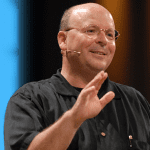Mike Glenn
These days, it seems everyone is marching for or against something. Immigration, student debt, corporate greed, more taxes, less taxes, healthcare, and climate change are just a few of the issues that can get people so riled up they take to the streets. Every march, of course, seems to bring a counter march. For every group that is marching one way, there’s another group marching the other way.
As I’ve watched, I’ve discovered something all of these marches have in common. Have you ever noticed everyone marches for more rights, but no one ever marches for more responsibilities? Everybody wants more healthcare, but no one marches to work out more and eat better. People will march against higher taxes, but no one ever mentions what part of the unfunded government services they’ll be willing to do without or do themselves.
Every marcher knows who to blame – and it’s always someone else.
I think about this every time I hear two Baptists debating the issue of the “priesthood of the believer”. Simply stated, the doctrine teaches everyone has equal access to Christ. We don’t have to go through another human being to pray or be led to the presence of Christ. Every person is able to act as a priest in the presence of Christ.
As you can imagine, this is a very precious teaching to Baptists and whenever two Baptists are in a discussion, it won’t be too long before one of the Baptists throws the “priesthood of the believer” card. When one of the participants says something like, “most scholars” or “the church historically has taught…” the other Baptist will say, “We believe in the priesthood of believer. We don’t have to get anyone’s approval of what we believe. It’s just what the Bible says to me”.
There is so much wrong with that statement. For one thing, that’s not what the doctrine teaches. While this precious teaching of every believer being a priest means we don’t need a human intercessor between Christ and us. We have the privilege of His presence. When we pray, we pray in the presence of our Risen Savior. We don’t have to count on another person getting our prayers to Christ with the meaning we intended. We can go directly to Christ and share what’s on our hearts and minds.
We can open His Word and ask Him to teach us the depth of His truths. Our Rabbi is alive, and He has promised to meet us in His Word. What a rare privilege! To be able to sit in the presence of the Author and discuss what He has written.
This is one of the meanings of “the priesthood of the believer”, but only one. We have access to His presence without having to seek anyone else’s permission or authority. Christ has opened the door for us. We can come to Him any time we want and honestly, Christ desires for us to come to Him much more than we do.
Sadly, too many of us have interpreted this beautiful teaching to simply mean, “My opinion is as good as yours”. This misunderstanding and misapplication of this teaching has led to countless fractures of friendships, careers and even churches. The doctrine of “priesthood of the believer” was never meant to embolden personal opinions, but to increase individual participation in kingdom ministry and kingdom conversations.
And this is the one part of the doctrine everyone misses. Everyone interprets the teaching to be about “me” — “me and my relationship with Jesus.” That interpretation, however, misses the whole point of being a priest. Yes, the priesthood of the believer means we have direct access to Christ, but it also means we have the calling to represent Christ to our neighbors. We have the responsibility to be Christ to each other.
Paul reminds us we are ambassadors for Christ, and through us, Christ is making His appeal to the world to be reconciled to God. So, we visit our neighbor when they’re sick or grieving and by our presence remind them Christ is here. We sit with a friend who’s messed up and remind them Christ has not giving up on them.
We feed the hungry.
We give water to the thirsty and clothes to the naked.
We go to prisons, hospitals, funeral homes and mental health wards.
We pray.
We teach.
We listen.
This is what priests do. This is what believers do.
The next time someone talks about the teaching of the priesthood of the believer ask the speaker if they really believe it. After they tell you about how many times they have gone directly to Christ, ask them how many times they have taken Christ to someone else. Ask them how many times they have been Christ to someone else.
That’s what being a priest means…hearing from Christ intimately and personally, and then, running to your nearest neighbor to tell what you heard.
















